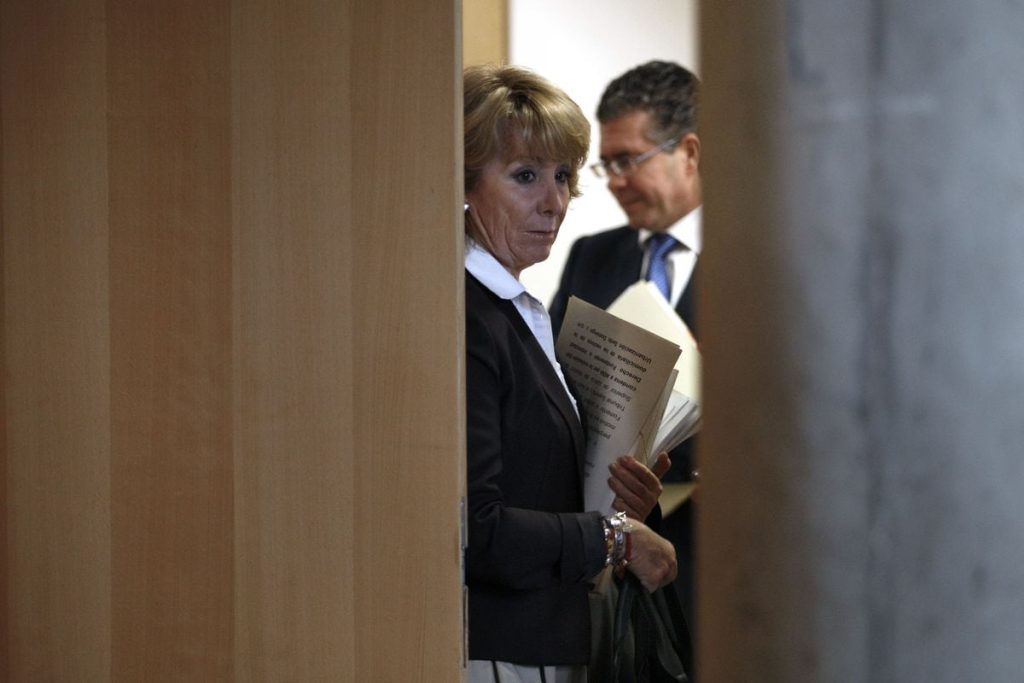The Anticorruption Prosecutor’s Office has requested that Esperanza Aguirre, former president of the Community of Madrid and the regional PP party, testify in the trial regarding the party’s slush fund. The public ministry, whose indictment has been accessed by EL PAÍS, considers it essential to hear the version of the former popular leader, who remained under investigation for three years for the alleged parallel accounting scheme orchestrated within the party she led, although the charges were ultimately dropped against her due to lack of evidence. In the upcoming trial, for which no date has been set yet, seven people will stand trial, including Francisco Granados and Beltrán Gutiérrez, who held the positions of Secretary General and Manager of the Madrid PP during Aguirre’s time.
Esperanza Aguirre, who wielded significant power in the Madrid PP and even threatened to challenge Mariano Rajoy for leadership of the national party in 2008, remained under investigation for three years in the probe into the party’s irregular financing, a line of inquiry opened as part of the Púnica case. She was at the center of the scheme, as she was one of the main beneficiaries of the slush fund: funds obtained were used for her electoral campaigns and money was diverted to pay for an online reputation campaign in her favor. Additionally, she headed the three organs where corruption took hold: the regional government, the Madrid PP, and Fundescam (Foundation for the Economic and Social Development of the Autonomous Community of Madrid).
However, with the support of the Prosecutor’s Office, Judge Manuel García-Castellón decided in 2022 to dismiss the case against Aguirre due to lack of evidence. Investigators believed there was not enough evidence to move beyond the charges and propose putting her on trial. As a result, the irregular financing responsibility was limited to Francisco Granados, former right-hand man of the president, who faces nearly eight years in prison; and Beltrán Gutiérrez, for whom the public ministry is requesting three and a half years of imprisonment. The prosecution’s indictment provides an in-depth look into the inner workings of the Madrid PP, refuting claims by party spokesperson Carlos Díaz-Pache that there was no irregular financing within the party.
The Prosecutor’s Office describes a scheme in which the Madrid PP obtained irregular resources to finance electoral campaigns and gain an unfair advantage at the polls. The public ministry mentions cash payments, the use of “friendly” businessmen, parallel accounting practices, all emanating from the heart of the party. The relationship between Granados and Gutiérrez was one of complete trust, with Gutiérrez acting as a link between those receiving cash from third parties and delivering it to the party headquarters. The Fiscalía has asked the court for a number of PP officials, including Ignacio González, Carlos Izquierdo, and former regional councilors, to testify as witnesses in addition to Aguirre.
The prosecution mentions Gutiérrez submitting significantly lower amounts to the Cámara de Cuentas than the actual costs, as authorized expenses were not declared or paid through the campaign account, distorting the reality presented to the audit body. The public ministry details how the irregular strategy was completed by using friendly businessmen to bill for services rendered under other concepts. Additionally, the PP used the Fundescam Foundation as another source of funding, including payments to a company for opinion polls to benefit the regional PP.
The prosecution also highlights the role of entrepreneur Alejandro de Pedro in providing online reputation services to high-ranking officials of the Madrid PP, such as Lucía Figar, Ignacio González, Isabel Díaz Ayuso, and Isabel Gallego. De Pedro managed to sell strategies for online image positioning to these officials, altering public opinion through digital media. The Anticorruption Prosecutor’s Office’s indictment sheds light on the complex web of irregular practices used by the Madrid PP to finance campaigns and manipulate public perception, implicating several key figures in the party’s leadership.















